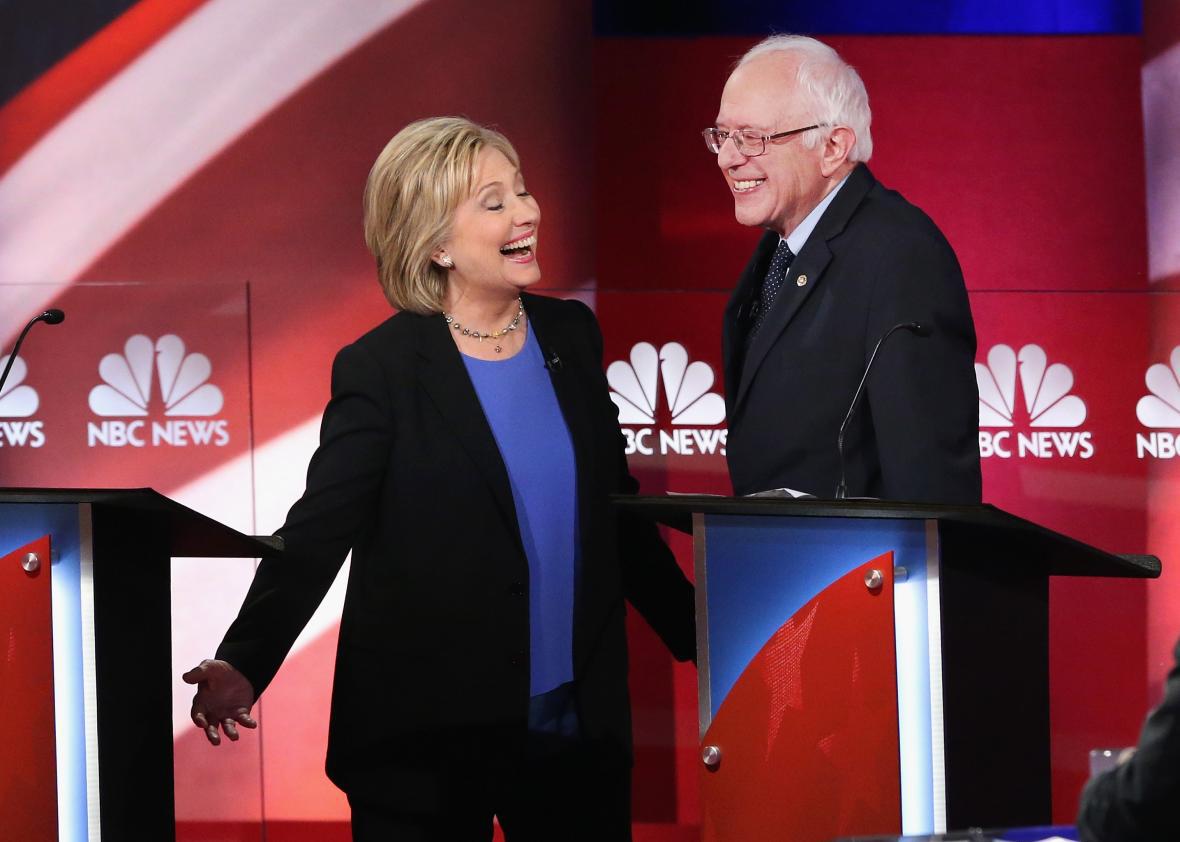With the Democratic primary contest growing closer, Hillary Clinton’s campaign is opening fire on Bernie Sanders’ foreign policy ideas, such as they are, namely his suggestion in a recent debate that the U.S. should move “aggressively” to normalize relations with Iran.
“This proposal to more aggressively normalize relations and to move to warm relations with Iran not only breaks with President Obama’s policy, it breaks with the sober and responsible diplomatic approach that’s been working for the United States,” former State Department staffer and Clinton adviser Jake Sullivan said Thursday. “The proposal would not succeed, but it would cause very real consternation among our allies and partners.” Then, several other campaign surrogates piled on.
Here’s what Sanders actually said on Sunday night in response to a question about whether he would support reopening a U.S. embassy in Tehran:
I think what we’ve got to do is move as aggressively as we can to normalize relations with Iran. Understanding that Iran’s behavior in so many ways is something that we disagree with; their support of terrorism, the anti-American rhetoric that we’re hearing from of their leadership is something that is not acceptable.
On the other hand, the fact that we’ve managed to reach an agreement, something that I’ve very strongly supported that prevents Iran from getting a nuclear weapon and we did that without going to war. And that I believe we’re seeing a thaw in our relationship with Iran is a very positive step. So if your question is, do I want to see that relationship become more positive in the future? Yes.
Can I tell you that we should open an embassy in Tehran tomorrow? No, I don’t think we should. But I think the goal has go to be as we’ve done with Cuba, to move in warm relations with a very powerful and important country in this world.
A lot depends on how you define “aggressively” here. Obviously it would be nice if the U.S. had warm relations with every country in the world. You could read Sanders’ statement as either a break with current policy, or as consistent with Obama’s famous pledge to authoritarian dictators to “extend a hand if you are willing to unclench your fist.”
It’s a little strange that Clinton would choose to go down this road, given past experience. In a 2007 Democratic primary debate, also held in Charleston, South Carolina, Barack Obama responded affirmatively to a YouTube question about whether he would be willing to meet “without precondition” with the leaders of countries like Iran, Syria, Venezuela, Cuba, and North Korea. The Clinton campaign seized on the answer as evidence of Obama’s lack of foreign policy qualifications, with Clinton herself calling it “irresponsible and frankly naïve.” As you’ll recall, that line of attack didn’t quite pan out for Clinton. (The concerns also proved mostly unfounded as the Obama administration waited until midway through his second term to change the status quo with Cuba and Iran. Syria is a whole other ugly story.)
The thing about Sanders’ foreign policy views is that he generally seems very uncomfortable discussing them, something even his supporters concede. The Nation’s editorial endorsing his candidacy noted that “The senator hasn’t talked as much as we would like about global challenges and opportunities, and we urge him to focus more on foreign policy.” Much more at ease on domestic economic issues, he often seems to be constructing his foreign policy on the fly, and some of his notions, such as the idea that Saudi and Iranian ground troops could work together to pacify Syria, rely on an awful lot of magical thinking.
So it’s certainly fair for a former secretary of state to attack the senator’s lack of foregn policy experience or know-how. But positioning herself to the right of her opponent on diplomacy with Iran in a Democratic primary didn’t work out well for her last time, and given recent events, it’s hard to imagine it will work better now.
Read more of Slate’s coverage of the Democratic primary.
